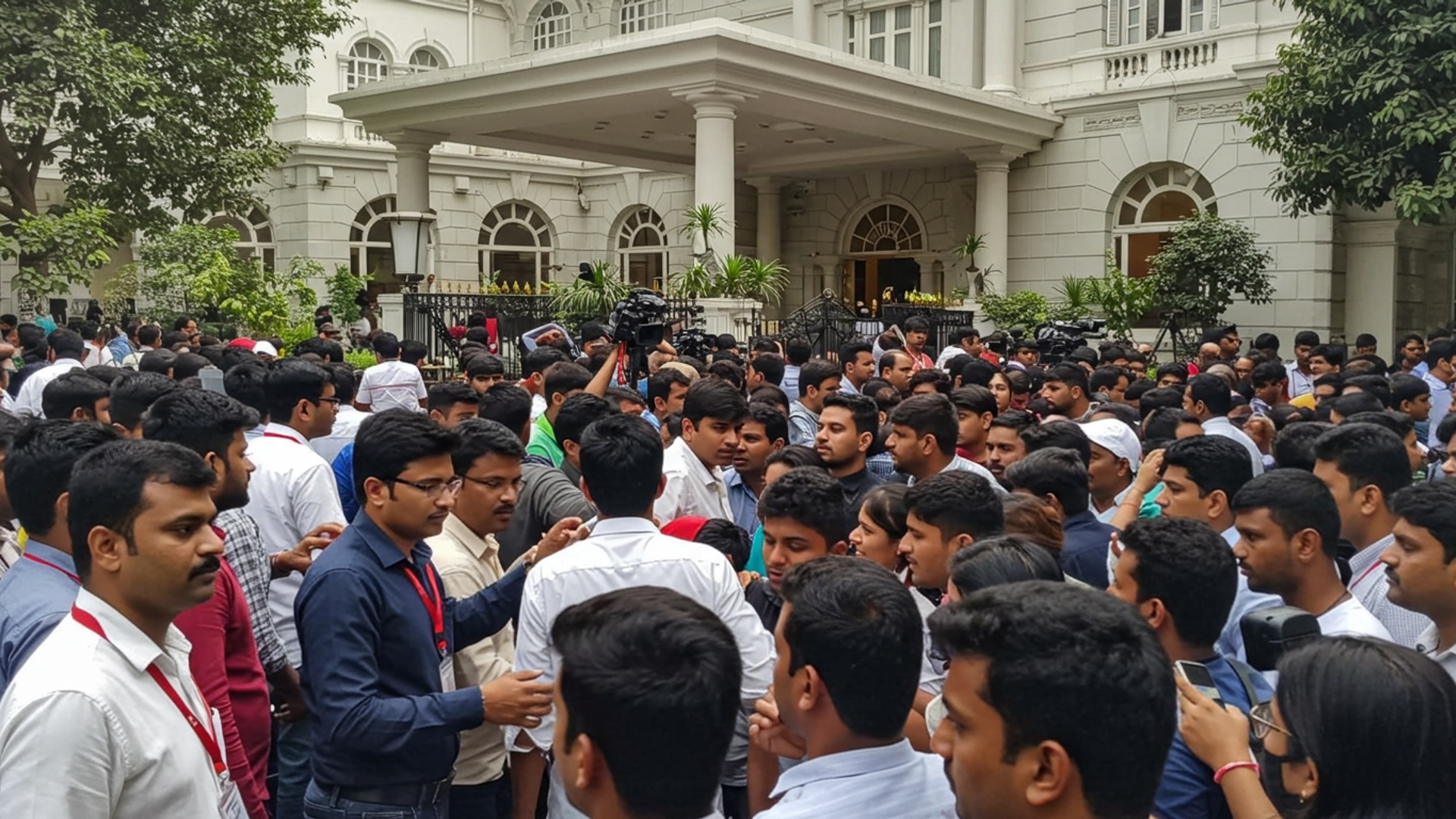The Indian stock market is currently gripped by a sharp downturn, as both the benchmark Sensex and Nifty indices witness intense selling pressure across the board. Heavy profit-booking and global uncertainties are fueling a widespread market correction this session, with technology stocks particularly breaking down under the strain. The Sensex has plunged significantly, dragging down the broader market, while the Nifty also registers substantial losses. This severe sell-off, especially devastating for the once-booming IT sector, leaves investors reeling from considerable wealth erosion and signals growing caution among participants.

Indian Markets Witness Sharp Decline: A Deep Dive into the Sell-Off
India’s benchmark stock indices, the Sensex and Nifty 50, experienced a significant downturn in recent trading sessions, reflecting a broader sentiment of caution and profit-booking among investors. The BSE Sensex, the flagship index of the Bombay Stock Exchange, saw a substantial fall, shedding thousands of points from its recent highs. Similarly, the Nifty 50, representing the National Stock Exchange, also registered a sharp decline, breaching key psychological levels. This widespread selling pressure resulted in considerable erosion of investor wealth, marking one of the most pronounced corrections the market has seen in recent times. The selling was broad-based, affecting a wide array of sectors. The insights technology (IT) sector particularly bore the brunt of the downturn.
Underlying Factors Driving the Market Correction
Several domestic and global factors converged to trigger the sharp sell-off in the Indian equity markets. A primary concern has been the rising global inflation, particularly in major economies like the United States, which has led to expectations of aggressive interest rate hikes by central banks. Higher interest rates typically make equity investments less attractive compared to fixed-income assets. Geopolitical tensions also continued to cast a shadow, contributing to global economic uncertainty and prompting a flight to safer assets.
“The current market correction is largely a reaction to a cocktail of global headwinds, including persistent inflation concerns and the hawkish stance of central banks worldwide,” stated Ms. Priya Sharma, a senior economist at a leading financial institution. “Foreign institutional investors (FIIs) have been net sellers in the Indian market, withdrawing significant capital, which further amplified the selling pressure.”
Domestically, while the economy shows signs of recovery, concerns over inflation and the potential for a slowdown in global demand have weighed on investor sentiment. Profit booking after a period of sustained gains also played a crucial role, as investors opted to lock in profits amidst the uncertain outlook.
IT Sector Bears the Brunt of Selling Pressure
The insights technology (IT) sector, which had been a major outperformer during the pandemic, faced intense selling pressure, leading to a significant decline in major IT stocks. This sharp correction in IT shares can be attributed to several factors:
- Global Recession Fears
- Valuation Concerns
- Rising Interest Rates
- Currency Volatility
Concerns about a potential recession in major economies, particularly the US and Europe, which are key markets for Indian IT services, have dampened the outlook for future IT spending by clients.
After a robust rally, many IT stocks were trading at elevated valuations. The current market environment prompted investors to reassess these valuations, leading to a correction.
Growth stocks, including IT companies, are often more sensitive to rising interest rates as higher borrowing costs can impact future profitability and reduce the present value of future earnings.
While a weaker Rupee can generally benefit IT exporters, the overall global economic uncertainty has created an environment of volatility that makes future earnings projections less certain.
A spokesperson from a major IT industry body commented, “While the global environment presents challenges, the long-term fundamentals of the Indian IT services sector remain strong. Companies are adapting to the evolving landscape, focusing on digital transformation and emerging technologies. This current phase is more of a market correction than a fundamental shift in the industry’s prospects.”
Broader Market Impact and Sectoral Performance
The sell-off was not confined to the IT sector alone. While IT stocks saw the steepest declines, other sectors also experienced significant losses. The financial services sector, including banking stocks, also witnessed selling pressure due to concerns over rising interest rates and their potential impact on loan demand and asset quality. Metals, real estate. Some consumer discretionary stocks also saw corrections.
But, some defensive sectors, such as fast-moving consumer goods (FMCG) and pharmaceuticals, showed relatively more resilience, as their demand is less cyclical and more stable even during economic downturns. The overall market sentiment reflected a cautious approach by investors, with a clear preference for value and stability over high-growth potential in the short term. The volume of व्यापार (trade) across segments also saw an increase, indicating heightened activity as investors adjusted their portfolios.
| Sector | Performance (Approx. % Decline) |
|---|---|
| insights Technology | 7-10% |
| Financial Services | 4-6% |
| Metals | 5-8% |
| Real Estate | 3-5% |
| FMCG | 1-2% (relatively stable) |
| Pharmaceuticals | 1-3% (relatively stable) |
Expert Outlook and What Lies Ahead for Investors
Market analysts suggest that the current volatility might persist for some time as global uncertainties continue to unfold. Investors are advised to remain cautious and adopt a long-term perspective rather than reacting to short-term market fluctuations.
Mr. Alok Singh, a veteran market strategist, advised, “This period of correction can be an opportunity for long-term investors to accumulate quality stocks at attractive valuations. But, it’s crucial to exercise due diligence and invest in fundamentally strong companies. Diversification across sectors and asset classes will be key to navigating the current turbulent waters.”
The Reserve Bank of India’s (RBI) monetary policy decisions and the government’s fiscal policies will also play a crucial role in shaping market sentiment. Any indication of easing inflation or a more stable global economic outlook could provide a much-needed boost to investor confidence. For now, the market remains in a consolidation phase, with investors closely watching global cues and domestic economic indicators for clarity on the path ahead for Indian equity markets and the broader व्यापार environment.














